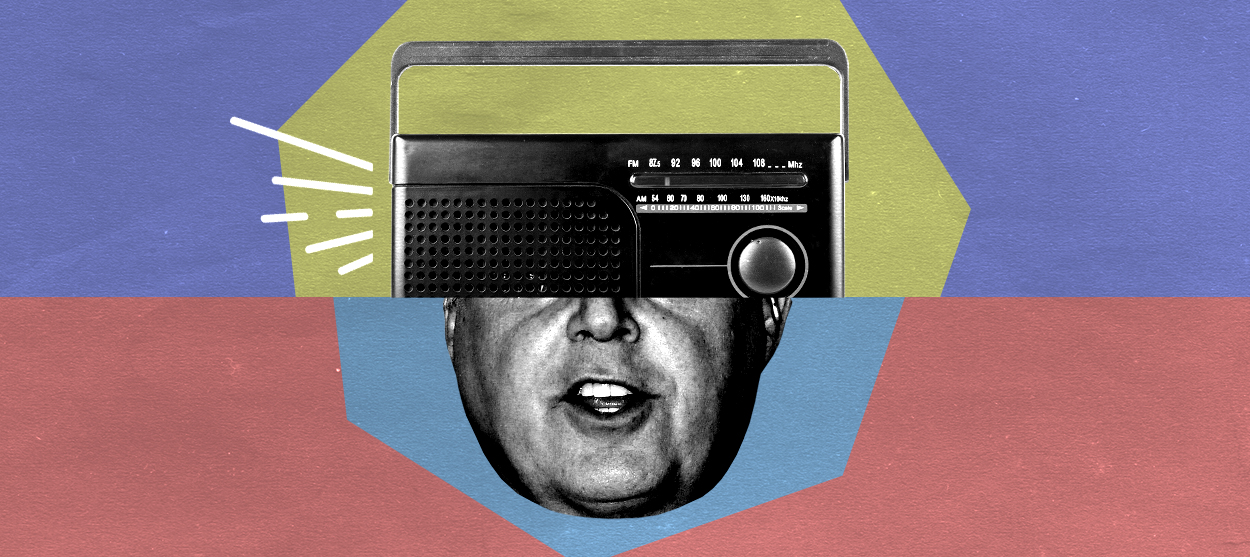How Rush Limbaugh broke the old media — and built the new one
Whether you like Rachel Maddow, Stephen Colbert, Joe Rogan, or Sean Hannity, you're engaging the media world created by the late radio host


A free daily email with the biggest news stories of the day – and the best features from TheWeek.com
You are now subscribed
Your newsletter sign-up was successful
Most remembrances of Rush Limbaugh, the talk radio titan who passed away on Wednesday at age 70 from complications of lung cancer, have focused on his seismic political impact, either excoriating him for being a hate monger or lionizing a champion gone too soon. But while such political arguments are worthwhile, they miss the breadth of how Limbaugh revolutionized media.
By pioneering a new type of in-your-face, conservative talk show, the host remade the rules of the medium and led to the founding of thousands of new talk radio stations. His success also drove the rise of infotainment media — which blended information and entertainment and blurred the line between opinion and fact — on radio, cable television, and the internet, and helped destroy the gatekeeper role of the mainstream media.
Limbaugh's style would come to be reflected in everything from late night comedy shows to cable news channels to podcasts of every ideological flavor and style — the very things that define our political media in 2021. Whether one likes Rachel Maddow, Stephen Colbert, Joe Rogan, or Sean Hannity, he or she is engaging the media world created by Limbaugh.
The Week
Escape your echo chamber. Get the facts behind the news, plus analysis from multiple perspectives.

Sign up for The Week's Free Newsletters
From our morning news briefing to a weekly Good News Newsletter, get the best of The Week delivered directly to your inbox.
From our morning news briefing to a weekly Good News Newsletter, get the best of The Week delivered directly to your inbox.
Damaged by music moving to FM, AM stations had begun experimenting with talk formats in the 1980s. Even so, on August 1, 1988 when Limbaugh debuted nationally, talk stations were still few and far between, limited largely to major markets. Most executives thought daytime talk needed to be local and outside of the few markets with multiple talk stations, the conversation was staid and gentlemanly, with an emphasis on callers and interviews. Most hosts leaned left, but their opinions were often undetectable. As the late Barry Farber, a conservative New York star in this era, told me in an interview, most hosts would've "fl[own] down to the Amazon and get our head shrunk before it would occur to attack the president."
Limbaugh upended this formula. He combined the sermonizing of an earlier generation of conservative broadcasters with the antics and fun of a disc jockey (he had been one), and the interactive talk format of conversational shows like Farber's. The product was zany, unpredictable, and unlike anything that listeners had ever heard. Limbaugh took far fewer callers, and his opinions were front and center.
But he didn't preach. Instead he used parodies, nicknames, themed updates, and tongue-in-cheek humor to espouse the conservative values he had learned around the dinner table growing up. Star Wars' imperial march (Darth Vader's theme) introduced "gorbasms," which discussed how liberals and the media naively swooned over Soviet Leader Mikhail Gorbachev, viewing him as the one who could save the world from Ronald Reagan's itchy trigger finger and nuclear holocaust.
A 1991 bit, "Gulf War Won," cast a fake miniseries on the Gulf War. While casting decisions humorously reflected appearances — Betty White as Barbara Bush, Ringo Star as Yasser Arafat, James Earl Jones as Colin Powell — they also reflected Limbaugh's conservatism. Suave, masculine action heroes and attractive starlets portrayed conservatives and their wives — picture Clint Eastwood as President Bush and Sylvester Stallone as Limbaugh himself — while liberals were mocked, emasculated or portrayed by villains, exemplified by Jack Nicholson as the Joker and Whoopi Goldberg respectively portraying CNN's Peter Arnett and Bernard Shaw, and Jabba the Hutt getting the role of National Organization of Women President Molly Yard.
A free daily email with the biggest news stories of the day – and the best features from TheWeek.com
Limbaugh's use of absurdity and insensitive humor sometimes crossed lines. On one 1989 show, he accepted votes for the theme song for "AIDS updates" and the candidates were Gene Autry's "Back in the Saddle Again," Dionne Warwick's, "I'll Never Love This Way Again," and Johnny Lee's "Lookin' For Love in All the Wrong Places." He also mentioned "Stayin Alive" by the Bee Gees as a possibility. That day, his AIDS news was that far fewer people had the virus than once thought because it "wasn't spreading to the heterosexuals." Limbaugh unapologetically told listeners wondering about his tastelessness that if he had to be exposed to television, radio, and newspaper content that he found tasteless and vulgar, he was allowed to throw it back at "them." Limbaugh later apologized for his AIDS content, something he'd have to do periodically, usually after saying something blatantly racist, misogynistic, or homophobic.
Yet, Limbaugh's success was massive — by 1993 he was broadcasting on 610 stations and reaching 17 million listeners per week. He had become a big enough cultural phenomenon that restaurants and local stations partnered to create Rush rooms where fans could eat while listening.
His popularity stemmed both from his entertainment chops and the way he connected with an audience hungry for broadcast content that reflected their conservative values. He fostered an intimate relationship with listeners, even sharing a unique language with them — someone who died, for example, had "assumed room temperature."
John Penn, a commercial artist in a Rush room in 1993 told U.S. News and World Reports that he listened because Limbaugh defined "the traditional American values that so many people consider a cliche." Another woman in the Rush room tuned in because, "Rush makes politics fun." She found Limbaugh to be a "hoot." As he tended to ribs in the pit at Chattanooga's Smokey's Barbecue in 1993, listener David Carmichael best summarized the mixture of Limbaugh's appeal: "I think he's funny," Carmichael told the Wall Street Journal, "Plus, I think he makes a lot of sense."
If anything, listeners only grew more devoted with time. On his last show of 2020, an emotional Kim in Minneapolis called to tell Limbaugh that she listened because he was "a dad to her," reminding her of her own father. She wanted to be a "Limbaugh Jr."
Limbaugh's meteoric rise spurred executives to launch talk stations, and crucially, they credited his ideology, not the fun he had on air, for his success, hiring a passel of local conservative hosts as a result. While each host had his or her (usually his) unique style and interests, one could hear Limbaugh's influence: rock or country songs as bumper music into and out of commercial, caustic nicknames, sound effects.
A turning point came when early-to-mid-'90s stations in Seattle and San Francisco branded themselves as all conservative talk stations and thrived. Their perhaps unlikely success reflected the reality that in a major market, a hit station only needed to grab 3 to 5 percent of the radio audience. But it also exemplified the niche of radio in the media landscape. The intimate medium appealed to the alienated in search of a clubhouse — which certainly applied to marginalized conservatives afraid to voice their views in these most liberal of cities.
The success of these stations turned conservative talk into the "it" format in radio. Once the 1996 Telecommunications Act drove the rapid consolidation and vertical integration of the radio business, successful local hosts and other conservative commentators launched new national programs. By late 2001, all conservative, largely syndicated formats — the style Limbaugh pioneered — became the norm.
All the while, Limbaugh remained talk radio's king. Hosts and executives, liberals and conservatives alike, credited him with saving AM radio, and his program drove what other shows talked about. Limbaugh was so big that he boosted other shows on his affiliates, because people tuned in early and left their radios on after he signed off.
With time, a new generation of hosts hit the airwaves — many of whom credited Limbaugh for their interest in conservative media.
Significantly, hosts were not journalists, often stressing that when caught in controversy or challenged over mistruths. Their goal was to put on a good show, one that was engaging and emotional. As Limbaugh told an interviewer, people turned on the radio for three reasons, "entertainment, entertainment, entertainment." He and his peers were in the business of, "drawing a crowd and then holding them."
Many critics missed this purpose, accusing Limbaugh of being vitriolic and politically motivated. Over time, he undoubtedly became more of a traditional commentator — less funny and more strident — because his early antics made some advertisers skittish and he seemingly viewed them as a young man's shtick. Yet, this charge still oversimplified things. Limbaugh's political goals were separate and subordinate to producing good radio. After seeing me discuss my book Talk Radio's America on TV, Limbaugh remarked, "This guy gets it more than anybody that I've ever encountered writing either about talk radio in general or about this program." Why? "I've not been secretive about what the purpose of this program is. He just happened to hear it and believe it."
The style Limbaugh inaugurated of in-your-face opinion-based content spilled over onto cable news with the rise of Fox News, which debuted in 1996 and had many hosts and guests with talk radio ties, and later the digital world. Even left-leaning late night comedy programs shared a crucial commonality — while they might inform viewers, the primary goal was putting on a rollicking show.
The rise of infotainment led to a world in which fact and fiction blurred, and shattered the gatekeeper role once held by the three networks, the major newspapers, the Associated Press, and after 1980, CNN. This reshaped media landscape made it easier for partisans to force issues of dubious importance or veracity into the political conversation. It also provided fertile ground for the spread of misinformation (Limbaugh was never averse to conspiracy theories), which though often absurd, was rarely dull and could provoke emotions and even actions — as Americans tragically learned on Jan. 6.
Even podcasts and digital shows, which have more ideological diversity thanks to a lower barrier of entry — there is no scarcity of high powered signals or promotional dollars as with radio — have the same goal, to reach through the speakers and grab listeners. Some focus on informing, but the distinctions aren't always clear.
This infotainment programming therefore is going nowhere even without Limbaugh on the scene. Nor is the world of muscular broadcast conservative opinion content that he pioneered and which gave voice to millions of conservatives. Whatever the delivery mechanism, Limbaugh's "formerly nicotine stained" fingerprints will be all over the media for decades to come, as voices ranging from Ben Shapiro to Joe Rogan continue his legacy.
Brian Rosenwald is a Resident Senior Fellow at the Robert A. Fox Leadership Program at the University of Pennsylvania, co-editor of Made by History at the Washington Post, and author of Talk Radio's America, forthcoming from Harvard University Press in 2019.
-
 6 of the world’s most accessible destinations
6 of the world’s most accessible destinationsThe Week Recommends Experience all of Berlin, Singapore and Sydney
-
 How the FCC’s ‘equal time’ rule works
How the FCC’s ‘equal time’ rule worksIn the Spotlight The law is at the heart of the Colbert-CBS conflict
-
 What is the endgame in the DHS shutdown?
What is the endgame in the DHS shutdown?Today’s Big Question Democrats want to rein in ICE’s immigration crackdown
-
 The billionaires’ wealth tax: a catastrophe for California?
The billionaires’ wealth tax: a catastrophe for California?Talking Point Peter Thiel and Larry Page preparing to change state residency
-
 Bari Weiss’ ‘60 Minutes’ scandal is about more than one report
Bari Weiss’ ‘60 Minutes’ scandal is about more than one reportIN THE SPOTLIGHT By blocking an approved segment on a controversial prison holding US deportees in El Salvador, the editor-in-chief of CBS News has become the main story
-
 Has Zohran Mamdani shown the Democrats how to win again?
Has Zohran Mamdani shown the Democrats how to win again?Today’s Big Question New York City mayoral election touted as victory for left-wing populists but moderate centrist wins elsewhere present more complex path for Democratic Party
-
 Millions turn out for anti-Trump ‘No Kings’ rallies
Millions turn out for anti-Trump ‘No Kings’ ralliesSpeed Read An estimated 7 million people participated, 2 million more than at the first ‘No Kings’ protest in June
-
 Ghislaine Maxwell: angling for a Trump pardon
Ghislaine Maxwell: angling for a Trump pardonTalking Point Convicted sex trafficker's testimony could shed new light on president's links to Jeffrey Epstein
-
 The last words and final moments of 40 presidents
The last words and final moments of 40 presidentsThe Explainer Some are eloquent quotes worthy of the holders of the highest office in the nation, and others... aren't
-
 The JFK files: the truth at last?
The JFK files: the truth at last?In The Spotlight More than 64,000 previously classified documents relating the 1963 assassination of John F. Kennedy have been released by the Trump administration
-
 'Seriously, not literally': how should the world take Donald Trump?
'Seriously, not literally': how should the world take Donald Trump?Today's big question White House rhetoric and reality look likely to become increasingly blurred
